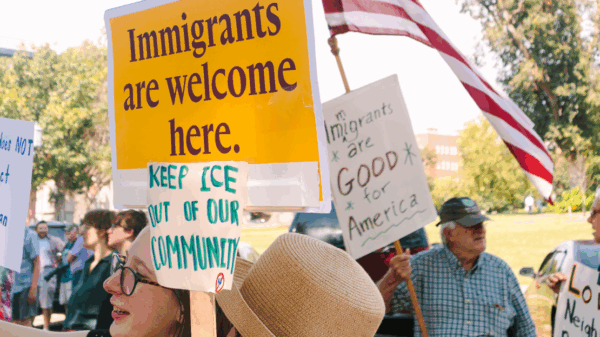

Stop 287(g)
Tell Congress to cut funding to 287(g)
We need to advocate against this program not just in our communities, but across the country.
Last updated on December 08, 2025
Stop 287(g) in Nebraska
Nebraska law enforcement agencies in 287(g) agreements are directly supporting the Trump administration's mass deportation goals, reducing community trust and hurting public safety.
Immigrants make our communities stronger. They are part of our families, communities, workplaces and places of worship. And right now, so many immigrant Nebraskans are living in fear because of the Trump administration's mass deportation machine and violations of basic rights.
Multiple Nebraska law enforcement agencies are now directly supporting these efforts through what's called a 287(g) agreement, a deportation collaboration program that essentially deputizes local sheriffs' deputies and police officers to act as immigration agents. These agreements hurt community safety by diverting resources from local public safety needs and making some immigrant families fear coming forward when they are victims of crime. They also encourage racial profiling, leading some police officers to use someone's skin color as a reason for a stop or investigation.
President Donald Trump campaigned on the promise to remove 20 million people from the country — more than 5% of our country. He and his administration are counting on local police to help make it possible.
All of us can help protect our neighbors by speaking out against 287(g) partnerships in our communities.
Current 287(g) Agreements in Nebraska
The dark parts of the map signify counties with active 287(g) agreements. If viewing on mobile, pinch in to view all of Nebraska and pinch out to zoom in.
- Banner County Sheriff's Office (Task Force Model)
- Dakota County Sheriff's Office (Jail Enforcement Model)
- Nebraska State Patrol (Task Force Model)
- Sioux County Sheriff's Office (Task Force Model)
- Wheeler County Sheriff's Office (Task Force Model)
Types of 287(g) Agreements
The 287(g) program has three models. All of them are harmful.
- The Task Force Model is the most expansive form of 287(g). Immigration and Customs Enforcement (ICE) calls it "a force multiplier." It delegates authority to local law enforcement officers to conduct immigration enforcement during traffic stops and other street enforcement. It was previously abandoned years ago after Department of Justice investigations of participating counties found patterns of racial profiling and discrimination.
- The Warrant Service Officer Model means that if someone is booked into local custody (charged but not convicted), local officers can continue to detain them after they post bail on the basis of an ICE administrative warrant. This also allows the officer to transfer that community member to a longer-term ICE facility.
- The Jail Enforcement Model is similar, facilitating immigration enforcement at local jails and giving corrections officers duties that they are ill-equipped to perform. It delegates certain immigration authorities to state and local law enforcement agencies to identify immigrants in custody and funnel them into immigration proceedings.
In other words, these partnerships allow situations like a police officer interrogating someone about their immigration status or local jails continuing to hold someone after a minor infraction - say, a caretaker who has lived in the United States for years - until ICE can come take her away.
These programs do not create safety; they create fear.
Negative Effects of 287(g) Agreements
Undermining Public Safety
Rather than making communities safer, this program undermines public safety by eroding trust in local law enforcement and deterring immigrant families from coming forward when they are the victims of crime.
All Nebraskans, regardless of immigration status, want to live free lives, participate in our communities and provide for our loved ones. But for some of us, state and federal anti-immigrant actions create fear that any interaction with a government agency might have catastrophic consequences for ourselves or a family member. A 287(g) agreement amplifies this fear many times over.
It is an understandable fear. A 287(g) agreement is entirely voluntary. Local law enforcement have no obligation to participate in the program or enforce immigration law. By signing an agreement, law enforcement officials are sending an unmistakeable message to local community members that officers may target them or their families.
While some officials have tried to defend participation in 287(g) as a public safety measure, a simple fact remains: the vast majority of people ICE detains have no criminal convictions. And studies of the 287(g) program have long shown show that the program actually undermines public safety by decreasing trust in local law enforcement and diverting resources away from investigation of serious crimes. That is why many law enforcement leaders have rejected offers to join the program. Some have even called for its termination.
Racial Profiling
287(g) programs can negatively impact whether community members are treated equally and fairly, regardless of their race, ethnicity or national origin. When local law enforcement plays the role of federal immigration agents, they have to make judgments about complex areas of federal law. That involves judgments far beyond their training and ordinary duties. Recent studies show the risk: the more law enforcement officers are required to investigate and interpret complex federal immigration laws, the greater the risk of racial profiling.
Nationally, federal officials ended a Maricopa County, Arizona 287(g) agreement after a U.S. Department of Justice (DOJ) investigation found a “pattern or practice of wide-ranging discrimination against Latinos.” In Alabama, 58% of people stopped by one 287(g)-deputized officer identified as Hispanic or Latino, even though those groups made up less than 2% of the population.
As for Nebraska, our first sheriff to adopt a 287(g) agreement, Dakota County Sheriff Chris Kleinberg, received communication from the Department of Homeland Security in 2021 about "discriminatory behaviors that directly impact [his office's] immigration encounters."
Even before the rapid recent growth of 287(g) agreements, Nebraska drivers identifying as Hispanic or Latino were drastically overrepresented in traffic stops — involved in 16% of all traffic stops in 2024. That is more than double the percentage just a decade earlier. With the Trump administration now covering the costs of salaries and benefits for participating officers and even offering cash bonuses in exchange for "successful location" of our immigrant neighbors and overall assistance in ICE's deportation efforts, it is all too likely that participating agencies will disproportionately target community members based on skin color, accent or last name.
Legal Liability
There are many ways for someone to be lawfully present in the United States, which state and local officers may not understand or which they may disregard due to lack of training or bias. 287(g) agreements expose counties to the risk of more rights violations and lawsuits. Taxpayer dollars are better spent investing in programs that actually keep our communities safe – not fueling a mass deportation machine or paying legal bills.

Sheriff Chris Kleinberg speaks at a 2022 candidate forum in Dakota County. A year earlier, DHS' Office for Civil Rights and Civil Liberties had recommended training on implicit bias and racial profiling based on an investigation that identified "several areas of ongoing concern."
Jerry Mennenga for the ACLU of Nebraska
Tell Congress to cut funding to 287(g)
We need to advocate against this program not just in our communities, but across the country.
What You Can Do
If you live in a community with a 287(g) agreement, contact your local sheriff and county commissioners to express your concerns about the program. Let them know that you want local law enforcement officers focused on local needs, not an anti-immigrant agenda.
If you live in a community without a local 287(g) agreement, work to keep it that way. Contact your local police chief, sheriff, city council member, mayor and county commissioner and tell them you do not want to see a 287(g) agreement in your community.
Finally, we need to make sure Gov. Jim Pillen hears our concerns about his decision to task the Nebraska State Patrol with immigration enforcement and that NSP leadership gets the same message.

